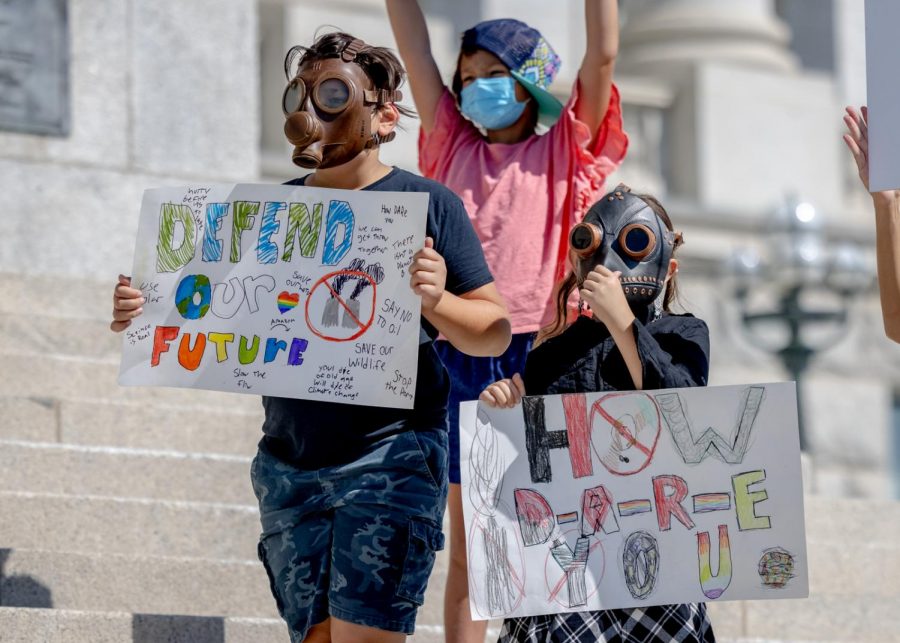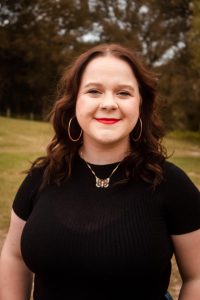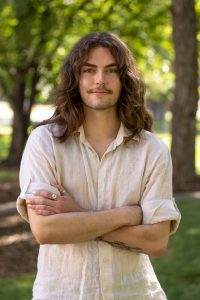Fridays for Future Utah Joins Global Climate Strike to ‘Uproot the System’
Two young protestors stand on the Utah State Capitol steps as part of the Global Climate Strike on Sept. 24, 2021. (Photo by Jack Gambassi | The Daily Utah Chronicle)
September 24, 2021
“The temperatures are rising and so are we,” six-year-old Arlo Dominguez sang from the steps of the Utah State Capitol Building. His song was a part of the Salt Lake City march organized by Fridays for Future, as part of the Global Climate Strike.
Beginning at Washington Square Park at 11 a.m. on Sept. 24, the group of preschool-aged kids to retired adults marched to the Utah State Capitol.
Among marchers was University of Utah junior, Sydney Crismon.
“I think it’s really important that people kind of just become aware of what’s going on,” Crismon said. “I think by each individual person coming out, it broadens the horizon of everyone that knows about it.”
Natalie Roberts, an organizer with Fridays for Future Utah who has been protesting at the Capitol for the past 60 weeks, said this year’s theme, “Uproot the System,” was about calling for drastic systemic change.
“We are trying to reorganize all those political, economic and social systems that are causing so much harm to this planet and the people that live on it,” Roberts said.
Raquel Juarez, the founder of Fridays for Future Utah, said this systemic change needs to occur in a way that takes into account the disproportionate effects of climate change on people of color.
“It has to be done in a just way so that it doesn’t continue that cycle,” she said.
Melanie Van Hook, another organizer, agreed with Juarez, saying climate justice means nothing without social justice.
“We need to put energy into the climate crisis but we also need to put energy into social causes,” she said. “Because what’s the point of having a healthy planet if there are people who aren’t happy and are suffering on it?”
Roberts said this global strike is especially important in a place like Utah, where the state remains in extreme drought conditions.
“The Great Salt Lake is drying up and that is going to cause many problems for our state,” she said. “We’re losing our winters. [Also,] Utah has a very large tie to the oil and gas industry.”
She also said everyone, no matter their age, needs to show up for the climate.
“We hope to see you there, because it’s all of our worlds,” she said. “Even though this younger generation will be affected the most, it’s important for parents and grandparents to support their children because they have really screwed up the planet and they’re handing their children basically a death certificate.”
After marching to the Capitol, Carl Moore, co-founder of SLC Air Protectors, a Native American-led nonprofit organization focused on environmental protection, started the speeches off with a land acknowledgement.
The zero emissions rally was powered by bike, with volunteer protesters coming up to pedal and power the microphone.
Gabe Dominguez performed an original song about the hypothetical breaking down of the Glen Canyon Dam.
“It’s a bit of a sing-along, because in order to break through the dam, literal and metaphorical, we all gotta do it together,” he said. “There’s no way we can do it by ourselves.”
To symbolize the dam, attendees wrote their answer to the fill-in-the-blank question, “We are smashing through ___ for Ecojustice.” The responses included: racism, fossil fuels, systemic oppression, capitalism, homophobia, etc.
As Gabe Dominguez sang, the crowd ran through the paper, symbolizing breaking down the systems written on it.
“Even though I might not be able to actually remove the Glen Canyon Dam or any of the other massive aggregate problems that are blocking us from Ecotopia in real life, in my imagination, I can live in Ecotopia immediately,” he said.
He has been providing the bike-powered speaker system for Fridays for Future for the past few events they have held and said he feels honored to create an event with people from “doctors to three year olds in their ballerina dresses, who want a livable future.” Another youth, Stella Greenberg, spoke about the ongoing drought in Utah.
“We are living in one of the top 10 hottest years on record, and it is not like our governor is helping either,” Greenberg said. “I don’t think asking a higher power, while maybe comforting for some, is going to stop the devastation this state is in. Gov. [Spencer] Cox needs to recognize that we see the effects of climate change every single day, but I doubt that he sees any of it.”
She said lawmakers need to take action against climate change and encouraged others to write letters and start petitions to call for systemic change.
“I dream for a future where I can live without the fear that I will not have enough water to drink, or never see another snow day, but together we can push for a more livable future for all of us,” she said.
Brian Moench, president of Utah Physicians for a Healthy Environment and former faculty member of the U’s Honors program, said his organization is joining Our Children’s Trust in their lawsuit against the climate crisis.
He called upon the protesters to sign up to be youth plaintiffs in the lawsuit and spoke about the heightened rates of anxiety and depression in young kids who are worried about their futures in a dying world.
“In fact, kids your age are wondering, is it safe for you to ever have your own kids?” Moench said. “What an absolute condemnation of our public policy directors that our own children are afraid to have any children of their own because of the climate crisis.”
Holding signs that read “Defend Our Future” and “If You Won’t Act Like Adults, We Will,” the youth of the movement expressed their concerns about not having a livable future.
“I am involved with the climate strike movement because I want to live in a sustainable, just future where we won’t die,” 14-year-old Roberts said. “Like is that too difficult of a thing to ask, not to die?”










